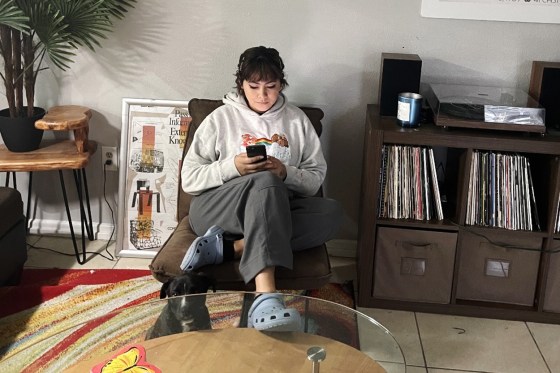In less than a month, Selina Herrera registered over 600 people to get Covid-19 vaccine appointments in Texas' Rio Grande Valley area.
Her volunteer initiative began when Herrera, 26, took it upon herself to register her relatives because she was the tech savvy one in her family.
The Texas resident figured that if her Latino family had trouble finding appointments — and she had time to do it — she could register others who might have difficulty doing so, such as native Spanish speakers, the elderly or people with disabilities.
"There are just so many barriers, and this is the solution I had," Herrera said. "I could offer this."
"I've been fortunate enough to be able to catch these appointments for them, and I just have to thank my really fast thumbs and super speed internet, which I know many people may not have," she said.
Sitting in her living room on her iPhone, Herrera uses a Google form she created at the beginning of March to schedule the appointments. It includes basic contact and health information, as well as how far the applicant is willing to travel to get a vaccine.
Her daily routine involves working on this during her lunch hour or in the evening after her full-time job, which involves providing quality assessment for case workers who work with clients enrolled in government programs like SNAP or Medicaid. Her weekends are solely dedicated to going through her Google form to facilitate appointments, she said.
The majority of her applicants are Latinos, which isn't surprising given they account for the overwhelming majority of the population in the Rio Grande Valley, a region on the southern border of Texas above Mexico.
Many of the people she signed up came through people she knew. Sometimes an applicant was signed up by a relative who didn't know about her work, so they were surprised or taken aback when she'd inform them of their appointment.
To reassure people they could trust her, she put a brief bio on her form. Many experts have said that the best way to get vaccines to hard to reach communities is through trusted sources, which also protects people from potential scammers.
The CDC and government officials have issued warnings about people soliciting money or personal identification information to make appointments that turn out to be fake.
People should be cautious about clicking on links, downloading anything and turning over identifying information online or by phone without carefully checking out the legitimacy of who is asking for the information.
Challenges of first-come, first-serve vaccinations
The main barrier for residents has been the limited appointment times. Most residents have been going to vaccination sites where they distribute wristbands on a first-come, first-serve basis but require people to wait in line for hours.
It's disappointing for them when they're turned away, Herrera said. They often have to take time off from work and transportation requires planning out the logistics, an even more difficult feat if they don't own a car, she said.
Residents who fill out her form provide their information and preferences. Herrera fishes for appointments online, looking on company sites like CVS and Walgreens that are offering vaccines, until she finds one that matches their distance preference and availability.
Once she confirms their spot, Herrera texts or calls them, in Spanish if that's their native language, where she often hears a huge sigh of relief.
"People offer me things and I'm like, 'No, it's OK. It's no big deal,'" she chuckled.
The number of applicants comes in waves and when asked about the specific number of people she's registered, she lost count after 440 but it's certainly above 600 by now. Herrera expects that number to change by next week and though she doesn't see this going on for the rest of the year, if more keep coming, she's happy to keep doing it.
"For every person I’m helping, that’s one less person that's reaching out or that needs to be vaccinated," she said.
Frustration over state's handling of Covid
Herrera expressed disappointment with what she sees as Texas' lack of leadership in protecting residents from the coronavirus pandemic.
The Lone Star state, as of Friday, had recorded nearly 2.8 million Covid-19 cases and over 48,500 related deaths, according to a running NBC News tally.
In the counties included in the Rio Grande Valley — Starr, Hidalgo, Willacy and Cameron — there have been nearly 105,000 Covid-19 confirmed cases reported since March 2020. The average percentage of those vaccinated with at least one dose was 43.2 percent, as of Friday.
Even though Texas holds the second-highest number of confirmed cases in the country, Gov. Greg Abbott, a Republican, lifted the state's mask mandate, rescinded most of his Covid-19 executive orders, and allowed businesses to open "100 percent," on March 10.
The decision has led to tensions with some local governments, including a high-profile clash after the state's attorney general sued Austin officials for refusing to enforce the governor's order to end the mask mandate.
Herrera is thankful that most residents in her community are still wearing masks. She's also relieved now that she has received her second vaccine dose; she was eligible due to a chronic condition and was able to schedule an appointment in early March, though it was an hour away from her home.
She's more at ease now and hopes to be able to help drive some people to their vaccine appointments if transportation is a barrier for them. Herrera wants others to have that same sense of security.
"I just feel good and I know I can share that with the people I'm helping. Once they get that vaccination, I hope they feel that, too — that relief, that weight lifted from their shoulders," she said. "That this is the next step they're taking to protect themselves."
Follow NBC Latino on Facebook, Twitter and Instagram.
